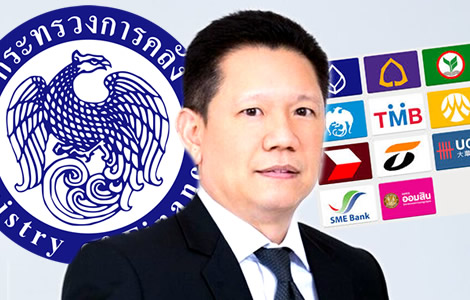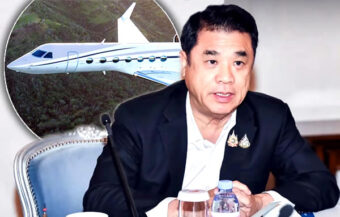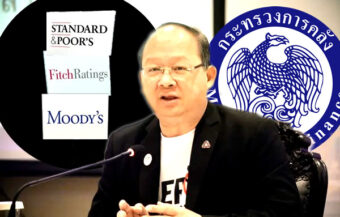Thailand’s Finance Ministry and Bank of Thailand join forces to tackle rising private debt and non-performing loans. With US tariffs, tourism decline and Chinese dumping, they push new asset management firms and prepare a rate cut to ease credit and boost the economy.
Thailand’s Ministry of Finance is teaming up with the Bank of Thailand to tackle mounting economic threats in the second half of 2025. The country faces stubbornly high private debt, aggressive product dumping from China and a punishing 19% tariff slapped on Thai exports under the Trump-era trade policies. The Bank of Thailand is poised to cut its baseline borrowing rate to ease pressure. At the same time, the ministry is pushing hard with the central bank to roll out new asset management tools designed to clean up a surge in toxic non-performing loans choking the banking sector.

Despite the optimism generated by the August 1st trade deal with the United States, there is a growing realisation that the Thai economy is facing headwinds in the third and first quarter of 2025. With foreign tourism down 6.56% up to August 3rd and Thai US exports now facing a 19% tariff charge, no one is under any illusion.
This is particularly so as US importers front-load orders before the tariff deadlines—first before the 10% baseline rate kicked in and later the new 19%, which came into effect on August 7th.
Meanwhile, the kingdom faces increased competition from US goods and the prospects of even more savage dumping from huge Chinese firms suddenly facing stiffer hurdles in accessing the United States market.
Thailand’s economy faces headwinds from tariffs, tourism slump, and rising trade and market competition
In addition to all of this, Thailand still has to deal with the massive burden of private sector debt, which, despite years of tight credit conditions, has moved only slightly downwards. Presently, the credit crunch not only extends to lower-income households but to over-extended middle-class homes and significantly, this year, Thailand’s large corporates.
Certainly, the Minister of Finance, Pichai Chunhavajira, is hoping that Thailand’s new Bank of Thailand governor, Vitai Ratanakorn, will be more amenable to government efforts to loosen monetary policy.
Indeed, even before he takes office on October 1st, the central bank is expected to lower rates that month by 25 basis points.
At the same time, the Ministry of Finance is already working with the Bank of Thailand on a scheme to help the country’s banks provide more liquidity and credit into the market. The plan envisages asset management companies (AMCs) to manage rising non-performing loans.
The Ministry of Finance is expediting the process. It aims to allow banks to establish AMCs to support increased lending and household debt relief.
Government moves to lower rates and speed up asset management companies to ease credit strain
The Ministry of Finance is expediting the process of enabling banks to establish AMCs to cover non-banks. This will encourage increased lending and address household debt. The Ministry of Finance is urging banks to use the Government Savings Bank’s ARI-AMC if they are unavailable.
Mr. Lavaron Sangsnit, Permanent Secretary of the Ministry of Finance, revealed progress. He is pushing for large commercial banks to establish asset management companies (AMCs). These will integrate non-performing loans (NPLs) into their management mechanisms. He said the Ministry of Finance is currently in discussions with the Thai Bankers’ Association.
It has received positive feedback from all parties. The Ministry is also exploring ways to extend AMC operations to non-bank NPLs, and is currently considering the mechanism.
If there is clarity, it will be submitted to the Cabinet. However, there is no need to report it to the House of Representatives, as it is not a law. It merely amends the criteria or relaxes the criteria of the governing body.
Ministry of Finance expedites establishment of AMCs for banks and non-banks to manage rising bad debt
Previously, a major obstacle was the Bank of Thailand’s regulations. These were not conducive to the establishment of AMCs by individual banks. However, the BOT has now relaxed these regulations.
The Fiscal Policy Office (FPO) and the BOT are working together continuously on this. This will enable faster progress and allow financial institutions to better manage their balance sheets and resume lending more efficiently.
“Today, all parties are ready and motivated. We believe that having an AMC will encourage banks to expand their lending and alleviate pressure from NPLs. It will allow them to fully return to their role as economic drivers,” said Mr. Lavaron.
The model will not involve setting up a national AMC. Rather, it will allow financial institutions that are ready to set up an AMC. Banks not ready to set up their own AMC, especially small banks or state-owned specialised banks, have another option. They can use the services of Aree Asset Management Company Limited, or ARI-AMC, a subsidiary of the Government Savings Bank.
Bank of Thailand eases AMC rules, allowing banks and small lenders to manage non-performing loans
Additionally, the NPL management approach also covers problem debtors whose records are recorded in the credit bureau. Normally, a 36-month waiting period is required before their records can be removed.
This project uses a system to categorise debtors based on risk level (e.g., colour classification). It will additionally shorten the timeframe to just six months. During this time, the bank acts as a “mentor,” providing advice and assistance in restoring their financial status. If the debtor’s potential is assessed, new loans can be immediately granted.
Top Banker to the less well off tipped as next Bank of Thailand boss when the cabinet meets next week
No more surprises or shocks. Thai foreign tourism players warn of a bad year with arrivals down 6.56%
Business leaders and bankers urge the government to push through the US-Thai tariff deal at all costs
Mr. Lavaron stated that clearer progress will be seen in August 2025. He believes this policy will significantly reduce household debt. Banks will be less concerned about NPL burdens, allowing them to manage their balance sheets more flexibly. In turn, they can return to their full role as an economic stimulus mechanism.
Join the Thai News forum, follow Thai Examiner on Facebook here
Receive all our stories as they come out on Telegram here
Follow Thai Examiner here
Further reading:
Last minute tweaks in Bangkok as deal is finalised with U.S. However, Thailand may not match Vietnam


















